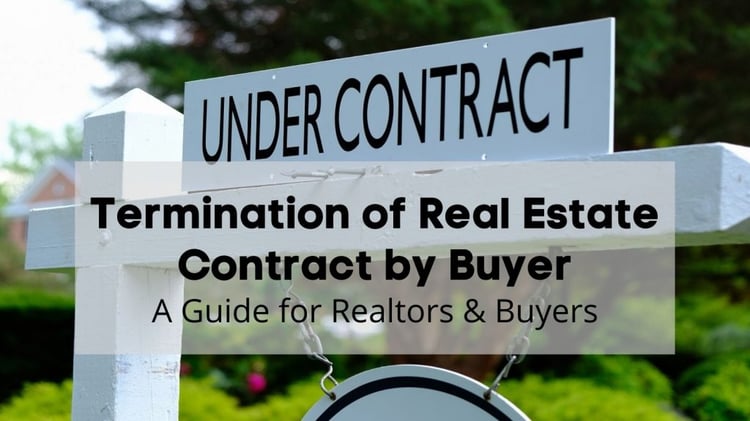Who Pays the Buyer's Agent Commission?
You're thinking it's time to stop paying rent and buy a home, but do you know who pays the buyer's agent commission in a real estate transaction?...
Can a buyer back out of a purchase agreement? What are the consequences? Who gets the earnest money? Here’s what buyers and agents need to know.

As a buyer, realizing you want to back out of a contract can be frightening and overwhelming. You probably have many questions. Can you back out of buying a house after signing a contract? Do you get your earnest money back? For real estate agents, learning that a client (or your client’s buyer) wants to back out also raises many questions and concerns.
Termination of real estate contract by buyer is possible, but it can only be done in certain circumstances to avoid significant consequences. It must also be done properly. Here is what buyers and agents need to know.
When it comes to cancelling a real estate contract, you may hear two terms used: release and terminate. These terms are very different.
Terminating a real estate contract is something one party does unilaterally when they have the legal right to do so. Real estate contract termination by a buyer may be done when the inspection turns up a problem the seller refuses to fix (with an inspection contingency), for example.
A release from a real estate contact is an action the seller and buyer must take together. This move releases the buyer and/or seller from their obligations under the contract. If the buyer does not have cause to terminate the contract, the seller can agree to release them in exchange for forfeiting the earnest money, as an example.
Make sure you know your state’s laws on real estate contract termination versus release and how it affects your client’s rights. Only a release of contract releases both parties from liability.
If your buyer client has a termination right, the earnest money cannot be released to them without a signed release of contract from the seller or a court order in many states.
Automatically asking for a release of contract isn’t always the right move. If the buyer has a legitimate right to terminate and the seller does not agree to sign a release, the termination deadline may be missed and the buyer’s right to terminate can be forfeited.
When it comes to canceling a real estate contract, you may hear two terms used: release and terminate. These terms are very different.
Terminating a real estate contract is something one party does unilaterally when they have the legal right to do so. Real estate contract termination by a buyer may be done when the inspection turns up a problem the seller refuses to fix (with an inspection contingency), for example.
A release from a real estate contact is an action the seller and buyer must take together. This move releases the buyer and/or seller from their obligations under the contract. If the buyer does not have cause to terminate the contract, the seller can agree to release them in exchange for forfeiting the earnest money, as an example.
In most states, buyers have many opportunities to legally back out of a real estate purchase agreement. The typical real estate contract has several contingencies that give the buyer a legal way to terminate the contract and have their earnest money refunded. Even if these contingencies are waived, many states have a period during which buyers can change their mind.
It’s important to carefully check the purchase agreement and deadlines attached. There may be one dozen or more deadlines to cancel a real estate contract depending on state law and contingencies.
For example, an option period may be 7 to 10 days once the contract takes effect. During this time, the buyer may be able to back out for almost any reason. Once this period ends, terminating the contract may only be allowed pursuant to specific clauses in the contract.
After reviewing the seller’s disclosures, there may be another deadline that allows the buyer to terminate. This may be up to five days.
The purchase agreement is not a legal contract until it is signed by both parties. A buyer can retract an offer if the seller has not yet responded. If the seller counteroffers, the buyer can still back out.
Options for terminating a real estate contract are more limited once an offer is accepted and the contract is signed.
It’s crucial for buyers and agents to understand not only when a buyer can back out of a real estate contract but how it should be done to avoid potentially serious consequences.
Bogged down by paperwork and deadlines? A Transactly transaction coordinator can handle all the paperwork, coordinate communication between parties, and manage transaction deadlines – including contingency deadlines and termination of contract forms. Save time, offer the best customer experience, and protect your clients – get started with a real estate TC today!
Depending on the contract, a buyer may be able to terminate a real estate contract based on a number of contingencies. Here are the most common options for how to get out of a house contract once it’s signed by both parties.
These are only common options; there may be other options available to a buyer who wants to back out of a contract. For instance, the seller may have failed to give required disclosures by the deadline.
Terminating a real estate contract requires following a specific procedure based on the state. In general, the buyer and their agent must give proper notice of buyer’s termination of contract. In some states, there is a specific form to use that informs the seller the contract is terminated and lists the clauses the allows the buyer to terminate.
In most states, what happens to the earnest money depends on the contract provisions.
Earnest money is generally returned to the buyer in one of two scenarios:
The seller generally keeps the earnest money if the buyer backs out of the contract without legal cause.
In most states, the buyer’s agent must request a release of contract. This must be signed by the seller to release both parties of liability and return the earnest money to the buyer. If the seller refuses to do so, a court may need to decide on the case.
There may be financial consequences of terminating a real estate contract, depending on the reason. The farther into the process, the more likely (and more expensive) these consequences tend to be.
When a buyer backs out of a contract that’s been signed, their earnest money is at risk. The average earnest money amount is 1% to 3% of the purchase price which is anywhere from $3,700 to more than $11,000 based on the average U.S. home price.
For the buyer, getting the earnest money back usually requires the seller signing a release of contract. If they do not, the earnest money can be tied up in a time-consuming process with the case heard in court.
If a buyer backs out of a sale without cause for terminating the contract, they forfeit their earnest money and may even be sued for additional damages.
While the law varies by state, a seller can sue a buyer for backing out of a sale – but it’s complicated and uncommon. In general, buyers can be sued if they do not properly terminate a contract based on a contingency. In this case, the seller can sue them for specific performance (following through with the purchase) or money damages for breach of contract.
If this happens, the earnest money does not necessarily limit the damages. That means a buyer can be sued for damages even beyond the deposit they put down.

You're thinking it's time to stop paying rent and buy a home, but do you know who pays the buyer's agent commission in a real estate transaction?...
Although technology has changed the way we start the buying process, buyer's agents are still important. What does a buyer’s agent do that has...
Should you sign an exclusive buyer's agent agreement? That's a common question for many home buyers. Deciding to sign an exclusive buyers agent...